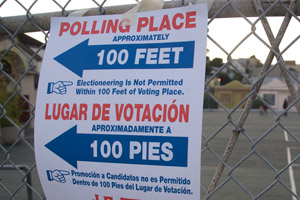If a tea party group won’t talk to the press, does it even exist? Activists say yes, but it’s a legitimate question, and one that came to mind this weekend while I was reading this interesting story in the Washington Post. In it, the Post published the results of its attempt to get an accurate census of the tea party movement and to gauge its impact on politics. The conclusions mirrored much of what I’ve noticed in the past year of reporting on the movement: While there may be a lot of conservatives out there sitting around their living rooms, holding hands and singing “God Bless America” and calling themselves a tea party, not all that many of them are well-poised to affect an election.
The Post highlighted an especially funny contrast between what one large organization, the Tea Party Patriots, claims about its membership, and what actually exists on the ground. Of the group, which Mother Jones recently described as organized a bit like a pyramid scheme, Amy Gardner writes:
The findings suggest that the breadth of the tea party may be inflated. The Atlanta-based Tea Party Patriots, for example, says it has a listing of more than 2,300 local groups, butThe Post was unable to identify anywhere near that many, despite help from the organization and independent research. In all, The Post identified more than 1,400 possible groups and was able to verify and reach 647 of them. Each answered a lengthy questionnaire about their beliefs, members and goals. The Post tried calling the others as many as six times. It is unclear whether they are just hard to reach or don’t exist.
The Tea Party Patriots leadership was deeply unhappy about this assessment. It sent out an email to members over the weekend decrying the story and suggesting that the reason the Post was unable to identify all the other groups listed on its website is not because they don’t exist, but because tea partiers just didn’t want to talk to the Post. They write:
The Washington Post got it wrong once again. Should be no surprise to anyone. Most Tea Party organizers did not resond [sic] to their survey because we know they are a leftist news agency.
But the Post isn’t the only outlet questioning whether Tea Party Patriots has inflated its numbers. Some disgruntled tea party activists in California have themselves questioned whether TPP can really lay claim to all the groups on its website; someone told me recently that an internal audit had even been conducted to check the numbers, and that it hadn’t turned out well (though I could never actually put my hands on it).
What all this means is hard to say. TPP recently received a $1 million donation from an anonymous donor who presumably was swayed by all those group numbers. Such donors might think twice next time around. But it also raises the question of what, ultimately, the tea party influence will be next week. TPP is frantically trying to get out the vote, through bus tours, poll watching ventures, and even some new Rush Limbaugh ads. But in my experience, when the group has organized events in DC, the vast majority of people who turned up to, say, lobby Congress against the health care reform bill, hailed from extremely conservative districts. Often they had no one to lobby, because their own representatives were already voting “no” on the bill. (Tea Party Patriots, in fact, got its start and is sort of headquartered in Woodstock, Georgia, Rep. Tom Price’s district. Those Georgia activists were wasting their breath lobbying Price, who was the Republican point-person on the health care fight, as he is one of the few doctors in Congress.)
Gardner’s observations also mirror complaints I heard a few months ago from a young tea party activist in Tennessee, who had started calling tea party rallies “picnics.” He was deeply frustrated with the people who associated with the tea party, because they never wanted to do anything but bring their blankets out on some lawn and listen to speeches. He complained that they were, ahem, “older,” and lacked a lot of energy for campaigning. He was frustrated that he couldn’t get them out to do the real work necessary to get conservatives elected.
That’s not to say that Republicans won’t win big time on Tuesday next week, but if they do, it’s likely not thanks to the the tea party group memorizing the Constitution in someone’s living room, but because of the corporate-backed GOP advocacy groups like Tea Party Express and FreedomWorks, which actually know how to pick a candidate, raise gobs of money, and get people to the polls. So much for the revolution.















